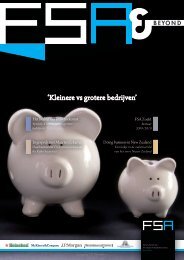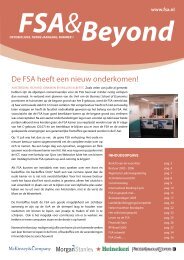You also want an ePaper? Increase the reach of your titles
YUMPU automatically turns print PDFs into web optimized ePapers that Google loves.
60<br />
Even though most of the risky products<br />
were rated as an AAA investment, it<br />
eventually turned out that these investments<br />
were actually very risky. This<br />
is where many things headed into the<br />
wrong direction. These kinds of actions<br />
should be made impossible by prohibiting<br />
them and by handing out penalties<br />
to banks that violate the rules. Supply<br />
and demand should be restored by<br />
making money more expensive. This<br />
eventually results in smaller balances,<br />
less risk within the financial system and<br />
higher returns on stocks. It can be concluded<br />
that central banks need to reduce<br />
the possibilities to take excessive<br />
risks. The only possibility is to do this<br />
is on the asset side, not on the liability<br />
side like Basel III addresses.<br />
WHaT RolE Do HEDGE fUNDS play iN THE cUR-<br />
RENT cRiSiS?<br />
The first thing to point out is that hedge<br />
funds are not the ones to blame. When<br />
looking at the animal kingdom, hedge<br />
funds fulfill the role of hyenas; they<br />
take care of the things that are not viable.<br />
They continually seek parties that<br />
do not create synergy and will eventually<br />
split them up. Italy for example,<br />
currently does not have a sustainable<br />
business case. It’s not the hedge fund<br />
that messed up Italy, but Italy itself is<br />
the one who is responsible for its current<br />
state. Hedge funds do not break up<br />
healthy businesses, because that would<br />
not make sense. Look at hyenas, why<br />
would they diminish strong buffaloes<br />
that bring along a lot of risk when there<br />
are enough weak, old and vulnerable<br />
buffaloes to deal with? Hedge funds<br />
diminish firms that can be seen as unhealthy<br />
and those that do not contribute<br />
to the system.<br />
interview Dolf van den Brink<br />
“<br />
This attitude made it<br />
very hard to default, but<br />
changed dramatically<br />
over the last few years.<br />
”<br />
WHaT iS THE DiffERENcE BETWEEN THE MiND-<br />
SET of TRaDiTioNal BaNkiNG aND iNvESTMENT<br />
BaNkiNG THaT Took THE lEaD foR THE laST<br />
coUplE of yEaRS?<br />
There are two types of thinking, Anglo-Saxon<br />
and the Rijnland Principles.<br />
Investment bankers are the typical<br />
Anglo Saxon thinkers whereas the<br />
traditional bankers are proponents of<br />
the Rijnland Principles. However, even<br />
though these two types are a world of<br />
difference, they can work side by side.<br />
Investment banks should work as a<br />
side construction that complements<br />
the Rijnland Principles.<br />
Do yoU THiNk BoNUSES coNTRiBUTE To THE<br />
SySTEM aND SHoUlD THEy BE pRoHiBiTED iN<br />
pERioDS of DoWNTURN?<br />
The entire bonus culture started when<br />
Johan Cruijff introduced the philosophy:<br />
‘do not be a thief of your own wallet<br />
when you are talented’. By making this<br />
statement, not only did he reach the<br />
sports sector, but he also infected the<br />
art-, music- and banking sector.<br />
Bonuses will never disappear, but should<br />
at least be mitigated. Bonuses do not add<br />
any productivity to a business. To the<br />
contrary, people even become self-cen-<br />
tered, and fights about how to divide the<br />
profit are not an exemption. Each year,<br />
employees become more and more obsessed<br />
about the bonus they will receive<br />
at the end of the year. This brings along<br />
negative energy and only negatively influences<br />
a company.<br />
It will probably be impossible to get rid<br />
of this whole mindset, but Europe should<br />
at least mitigate bonuses by giving out<br />
bonuses up to a maximum of half of the<br />
yearly wages. The complex discussion on<br />
how to solve this matter has surely darkened<br />
the social cohesion within banks.<br />
Noted should be that 80% of the banking<br />
sector comprises retail bankers that do<br />
not earn bonuses. Because these employees<br />
also work in the banking sector, they<br />
will be stared at as if they are moneygrubbers.<br />
Banks should take a serious look at<br />
these important matters or else it might<br />
happen that regulation will do it for them.<br />
WHaT iS THE cURRENT poSiTioN of THE DUTcH<br />
BaNkS?<br />
In the Netherlands, it looks like the<br />
system cleanses itself by remediating<br />
investment banks. A good example is<br />
Royal Bank of Scotland that recently<br />
took over the majority of the investment<br />
branch of ABN-AMRO. Dutch banks











